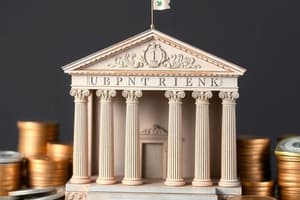Podcast
Questions and Answers
What defines liquidity in the context of payment participants?
What defines liquidity in the context of payment participants?
- Owning physical banknotes issued by any financial institution.
- Having sufficient investment assets available.
- Possessing adequate money or available balances in a settlement account. (correct)
- Having access to multiple financial services.
Which of the following is considered central bank money?
Which of the following is considered central bank money?
- A digital wallet balance from a financial app.
- Funds held in a savings account.
- A physical banknote issued by a central bank. (correct)
- A deposit at a commercial bank.
What are reserve requirements in central bank accounts primarily used for?
What are reserve requirements in central bank accounts primarily used for?
- To calculate the interest rates on loans.
- To ensure the health of the financial system amidst market disruptions. (correct)
- To provide loans for businesses.
- To increase the profits of commercial banks.
What happens during settlement in central bank money?
What happens during settlement in central bank money?
What type of accounts do Payment Service Providers (PSPs) maintain with central banks?
What type of accounts do Payment Service Providers (PSPs) maintain with central banks?
Which of the following correctly describes the claims related to central bank money?
Which of the following correctly describes the claims related to central bank money?
What role does the Bank of England play in payment systems?
What role does the Bank of England play in payment systems?
What must PSPs have to perform settlement in central bank money?
What must PSPs have to perform settlement in central bank money?
Flashcards
Liquidity
Liquidity
Having enough money or available balances in a settlement account to complete a payment.
Central bank money
Central bank money
Money issued by a central bank, such as physical banknotes or electronic balances held at the central bank.
Central bank accounts
Central bank accounts
Accounts held by commercial banks or other financial institutions at the central bank.
Settlement in central bank money
Settlement in central bank money
Signup and view all the flashcards
Reserve requirements
Reserve requirements
Signup and view all the flashcards
Settlement finality
Settlement finality
Signup and view all the flashcards
Bank of England's role in settlement
Bank of England's role in settlement
Signup and view all the flashcards
Intraday liquidity
Intraday liquidity
Signup and view all the flashcards
Study Notes
Central Bank Money and Accounts
- Liquidity refers to a payment participant having enough money or available balances in their settlement account.
- Central banks issue money, but not all issued money is considered central bank money.
- Physical banknotes are central bank money.
- Electronic money held in a central bank account is also central bank money.
- Money issued by a central bank, but held electronically in a commercial bank account, is not considered central bank money.
Central Bank Money
- Central banks are responsible for issuing money.
- A claim is held by the owner of the money. A claim on a central bank is different from a claim on a commercial bank.
- Central banks often require participants (like commercial banks) to have accounts and maintain deposits representing a percentage of their liabilities. These deposits are called reserve requirements.
- These reserves are important for maintaining financial system stability.
Central Bank Accounts
- Central banks require participants to hold accounts with them, which are used for various purposes.
- Participants may need to maintain reserve accounts with the central bank.
- Reserve requirements are often a set percentage of the participant's liabilities.
Settlement in Central Bank Money
- Payment processors (PSPs) interacting with central banks must have settlement accounts.
- Transfers between PSPs involve the central bank moving funds between accounts.
- Settlement occurs when a payment is made—funds are transferred from one account to another.
- Adequate liquidity for the PSP is necessary for settlement.
- Settlement finality can be legislated.
FACTFIND: The Role of Central Banks in Settlement
- Central banks provide payment system services, settlement accounts to participants, daily liquidity access to settlement accounts, and balance sheet protection.
- Example: The Bank of England in the UK provides these services.
Studying That Suits You
Use AI to generate personalized quizzes and flashcards to suit your learning preferences.




